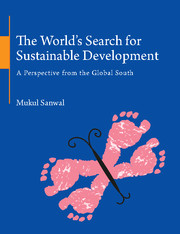Book contents
- Frontmatter
- Dedication
- Contents
- Preface
- Acknowledgments
- Abbreviations
- INTRODUCTION
- 1 Social Dimension of Sustainability
- CONSUMPTION IN AN UNEQUAL WORLD: FRAMING INTERNATIONAL COOPERATION
- CLIMATE POLICY: GLOBAL TO NATIONAL
- 6 Political Origins of Climate Policy
- 7 Questions on the Framework
- 8 Burden Shifting Rather than Burden Sharing
- 9 Development of a Shared Vision
- 10 The Middle Class and Global Ecological Limits
- 11 The New Climate Regime
- SUSTAINABLE DEVELOPMENT: NATIONAL TO GLOBAL
- CONSUMPTION IN A MORE EQUAL WORLD: SHAPING SOCIETAL FUNCTIONS
- GEOPOLITICS TO GEOECONOMICS: RURAL–URBAN DIVIDE, RATHER THAN BETWEEN COUNTRIES
- THE ASIAN CENTURY
- Index
11 - The New Climate Regime
from CLIMATE POLICY: GLOBAL TO NATIONAL
Published online by Cambridge University Press: 18 December 2015
- Frontmatter
- Dedication
- Contents
- Preface
- Acknowledgments
- Abbreviations
- INTRODUCTION
- 1 Social Dimension of Sustainability
- CONSUMPTION IN AN UNEQUAL WORLD: FRAMING INTERNATIONAL COOPERATION
- CLIMATE POLICY: GLOBAL TO NATIONAL
- 6 Political Origins of Climate Policy
- 7 Questions on the Framework
- 8 Burden Shifting Rather than Burden Sharing
- 9 Development of a Shared Vision
- 10 The Middle Class and Global Ecological Limits
- 11 The New Climate Regime
- SUSTAINABLE DEVELOPMENT: NATIONAL TO GLOBAL
- CONSUMPTION IN A MORE EQUAL WORLD: SHAPING SOCIETAL FUNCTIONS
- GEOPOLITICS TO GEOECONOMICS: RURAL–URBAN DIVIDE, RATHER THAN BETWEEN COUNTRIES
- THE ASIAN CENTURY
- Index
Summary
Re-emergence of China and India
According to an analysis of economic trends by the Organization for Economic Co-operation and Development (OECD), the think-tank of the developed countries, around 2030 Asia will be the world's powerhouse just as it was prior to 1800. This suggests that these countries will define standards of living, natural resource use, global values and international cooperation [OECD, 2012;].
First, though it is now universally acknowledged that countries gain in influence more because of the size of the economy than the strength of their military, the global implications of the rising economic power of Asia have yet to be grasped. Currently, the OECD has two-third of global output compared to one-fourth in China and India, and by 2060, these two countries will have a little less than half of world GDP with OECDs share shrinking to one-quarter. The new giants are expected to establish new institutions and shape new global rules rather than challenge the international system which led to their rise.
Second, in addition to changes between States there will be changes in country shares of global GDP, largely driven by ageing populations. China is expected to surpass the United States around 2020 to become the largest economy in the world. India's GDP will equal that of the Euro area in 2030 and in 2060 it will exceed that of the United States, increasing from 11 to 18 per cent as a share of global GDP while China's share will remain at 28 per cent during this period, as its dependency ratio will quadruple, and the relative share of both the United States and the Euro area will decline. The working age population of China has peaked, while India has half its population – 650 million people who are less than 25, out of which 400 million are less than 15 years old, presenting a very different set of challenges compared to the other powers.
Third, living standards will rise but differences will persist. Both China and India will experience more than sevenfold increase in income per capita by 2060, but China could equal and India is expected to be little more than half of current U.S. levels – with a significant impact on patterns of natural resource use and emissions of carbon dioxide.
- Type
- Chapter
- Information
- The World's Search for Sustainable DevelopmentA Perspective from the Global South, pp. 154 - 166Publisher: Cambridge University PressPrint publication year: 2015

